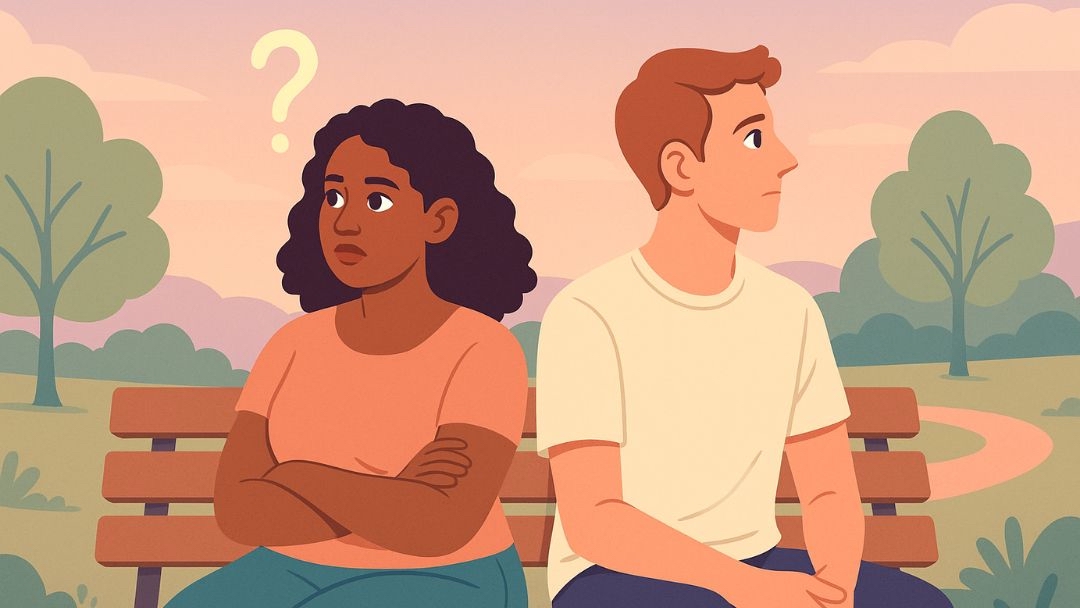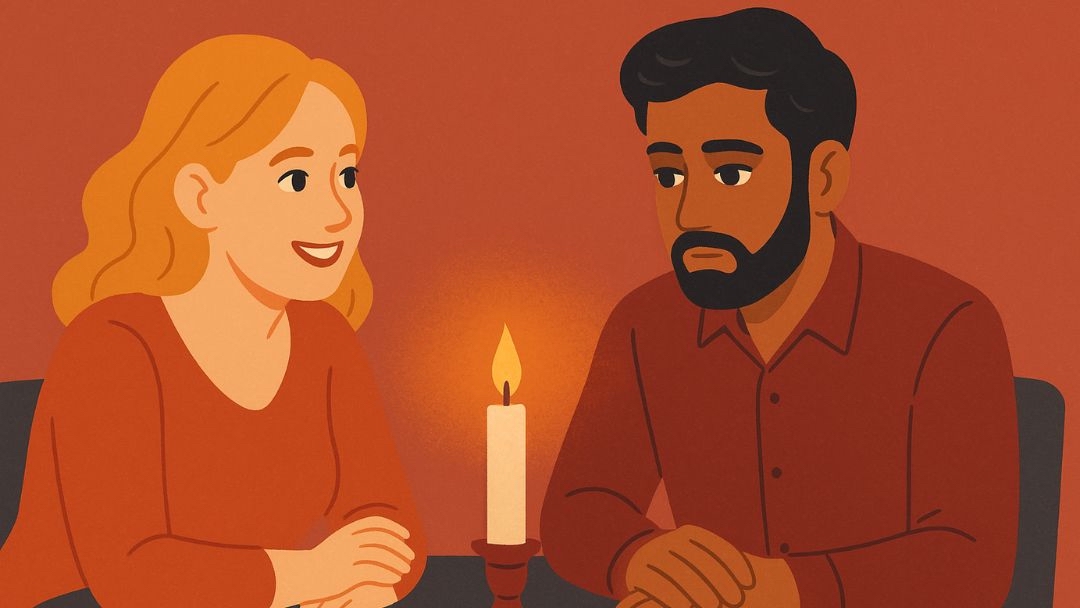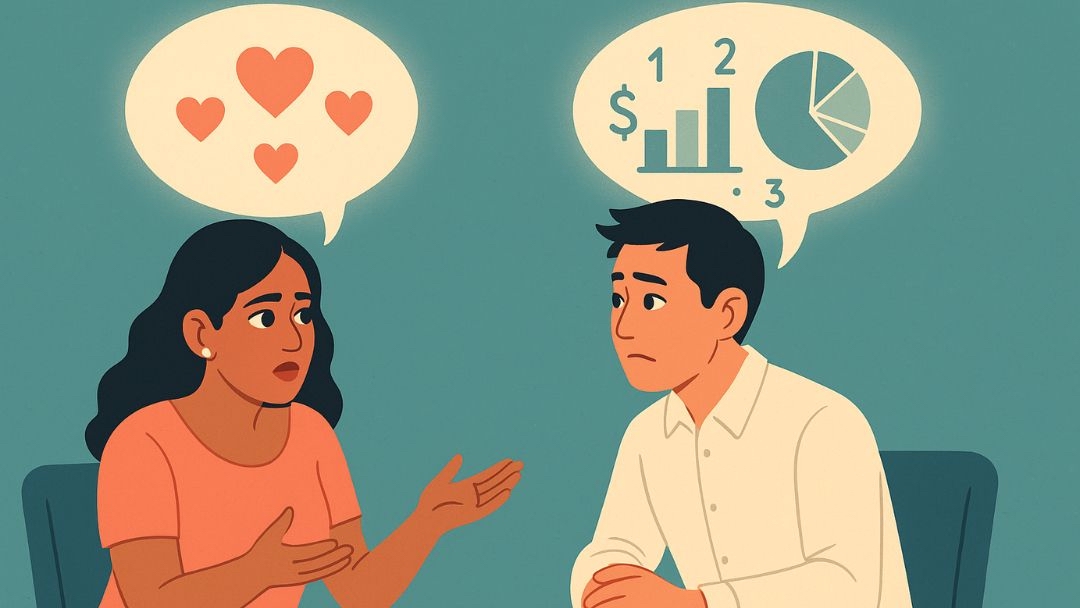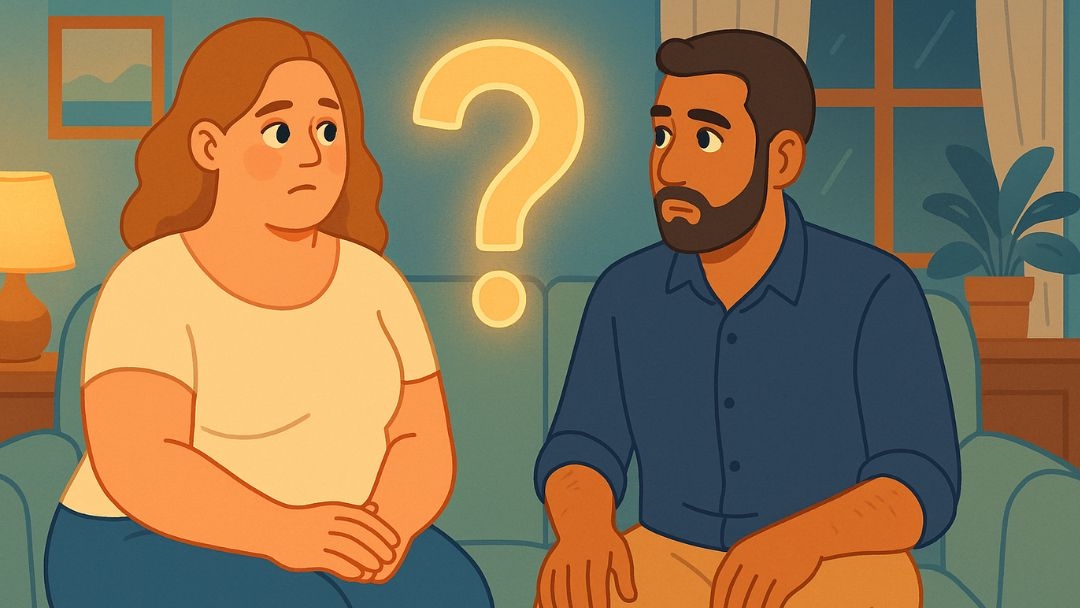Understanding Relationship Doubts: Is It Okay to Have Concerns?
Many believe that once doubts creep into a relationship, it’s the beginning of the end. After all, if you truly love your partner, why feel uncertain about your relationship? This guide explores the most common relationship doubts couples have, how they show up in real life, and tips to navigate them before they damage your connection.


Back
8 mins read
The first time I had serious doubts about my current relationship, I panicked. After so long in the honeymoon phase, that first crack felt like a sign that everything we’d built was about to crumble. But we got through it, along with other doubts that followed, and we’re still going strong years later.
In hindsight, I’ve realized something important.
It is perfectly normal to have doubts in a relationship, even when things seem fine on the surface. Doubts don’t automatically mean your relationship is failing or that you’re a bad partner. In fact, almost every healthy relationship faces them at some point.
Relationship doubts aren’t always loud. Sometimes they sneak in quietly; other times they hit you all at once, making you question everything. I’ve experienced both and learned that, if handled well, doubts can strengthen a relationship.
Related: How to Be an Adult in Relationships: Tips for More Fulfilling Connections
13 Common Relationship Doubts and How to Address Them
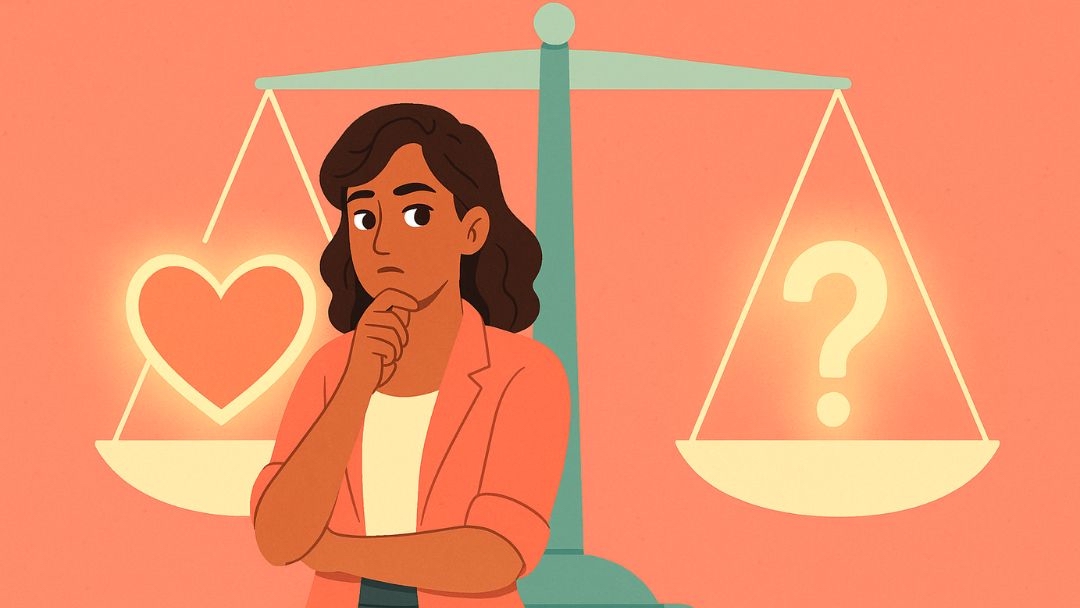
Relationship doubts are questions or uneasy feelings you have about your partner or the relationship. They can stem from noticing your partner’s quirks, confronting personal insecurities, or sensing that something in your relationship needs attention. The challenge is knowing when to ignore them and when to trust your instincts to look deeper.
Below are common relationship doubts, with real-life examples and quick gut-checks to help you figure out what’s going on.
1. What if I find someone else attractive?
Feeling drawn to someone outside your relationship can trigger confusion or guilt, even if nothing happens.
You had a fun conversation with a charming stranger at a friend’s dinner party. Later, you catch yourself thinking about them, even though you’re in a committed relationship. The attraction was brief and innocent, yet it still leaves you feeling guilty, questioning your feelings for your partner, or worrying if it means something deeper.
Gut-Check Tip
A passing attraction doesn’t mean your relationship is broken. Notice how often it happens and what it stirs in you. If it’s fleeting, let it pass. But if it’s persistent or emotional, it may be time for an honest check-in with yourself and your partner.
2. What if I’m no longer attracted to my partner?
Changes in physical or emotional attraction can create distance and uncertainty, even when the relationship still matters to you.
You’re out for date night with your partner, but the spark feels missing. You miss the fun conversations and playful banter. Across the room, a couple is having the best time, reminding you of how your relationship used to be. There’s been no fallout or betrayal, but you’re now wondering why your heart no longer races when you see your partner.
Gut-Check Tip
Attraction can ebb and flow, especially in long-term relationships. Check whether the loss of attraction is about your partner or something temporary like stress, routine, or unmet emotional needs. Reconnecting emotionally can often reignite attraction.
3. What if we’re not compatible emotionally or intellectually?
Differences in how you process feelings or approach the world can leave you feeling unheard or unseen.
You’ve had a long week, and you open up about how drained you feel. Your partner shrugs it off and shifts the focus to their work drama. Later, when you bring up your dreams or values, they show no interest. You still share laughs, but you rarely have meaningful conversations or feel emotionally seen.
Gut-Check Tip
Perfect alignment isn’t required, but mutual effort is. Pay attention to whether your partner tries to meet you halfway or keeps shutting you out.
4. What if we’re not compatible in bed?
Mismatched sexual needs, preferences, or comfort levels can create tension in a relationship.
It’s your long-awaited weekend getaway. The mood is set, the atmosphere warm, and you’re hoping to reconnect physically. But when you initiate, your partner gently pulls away, saying they’re tired. It’s not the first time, and you start wondering if it’s just stress or a sign you’re not on the same wavelength in bed.
Gut-Check Tip
One-off night is normal, but repeated disconnection around intimacy can signal deeper issues. Compatibility often improves with open, judgment-free conversations and a willingness to meet each other’s needs.
5. What if I’m not ready to commit, or they’re moving faster than I am?
When your partner’s pace feels too fast, it can create pressure and make you question the entire relationship.
Your partner talks about marriage and children while you’re still getting used to calling them your significant other. At dinner, they ask how you’d feel about meeting their parents next weekend. You smile politely, change the topic, and feel a familiar knot in your stomach. You like them a lot, but it’s not the first time you’ve dodged the subject.
Gut-Check Tip
Are you not ready for commitment at all, or just not with this person? Sometimes timing is the issue, but other times, it’s the relationship itself that doesn’t feel right. It could also be that you are dealing with an unresolved, unhealthy attachment style.
6. What if I’m settling and there’s someone better out there?
Doubt about whether you chose the right person can arise when someone new seems to offer what you feel you’re missing.
At a friend’s wedding, you meet someone who shares your quirks, makes you laugh effortlessly, and understands you in a way that feels oddly refreshing. Your partner is kind and dependable, but you wonder whether you chose them out of comfort or fear of being alone.
Gut-Check Tip
Check if this doubt is rooted in a fleeting spark or long-standing dissatisfaction. Would you still feel unsure if that new person hadn’t appeared? Focus on whether your current relationship truly meets your needs.
7. What if my partner doesn’t love me the way I want to be loved?
You might feel emotionally unfulfilled if the way your partner shows love doesn’t match the way you receive it.
You’re overwhelmed with work and house responsibilities, and what you want is for your partner to share the load. Instead, they bring you flowers, write heartfelt notes, and plan date nights. It’s sweet, but it doesn’t ease your burden. They’re trying in a way that makes sense to them, but their love feels disconnected from what you truly need.
Gut-Check Tip
Be clear about what makes you feel loved, and see if your partner is willing to learn. Love language differences can be bridged, but persistent emotional neglect is a deeper problem.
8. What if I can’t be fully open with my partner, or they struggle to open up with me?
A lack of emotional vulnerability from either partner creates distance and uncertainty in the relationship.
Your partner’s parent is seriously ill, and it’s weighing on them. You ask, “How are you holding up?” They reply, “I’m fine,” then quickly change the subject. You want to be there for them, but the emotional wall never comes down.
Gut-Check Tip
Notice if this is a temporary silence or a long-term pattern. Some people open up slowly, but if emotional depth is always missing despite your efforts, it may signal a lack of trust, emotional safety, or deeper disconnection.
9. What if we can’t talk about problems without arguing?
When every conversation with your partner results in conflict, it’s hard to feel like a team.
You mention they’ve been on their phone too much during dinner. They get defensive, you get frustrated, and soon you’re rehashing old fights. Every attempt to voice out a concern turns into raised voices or cold silence, so you start walking on eggshells to keep the peace.
Gut-Check Tip
Check whether the blow-ups are rare or constant. If conflict is the default, the real problem might not be the issue itself, but whether you both feel safe, heard, and respected when discussing it.
10. What if we disagree about money or financial priorities?
Differences in spending and saving habits can cause uncertainty about long-term alignment.
You received a $20,000 year-end bonus and immediately plan to pay off loans, grow your savings, and invest the rest. Your partner suggests spending it on a month-long trip through Europe and Asia, because “we’ll never be this young again.” What feels like responsible planning to you feels like missed opportunities to them.
Gut-Check Tip
If you share the same long-term vision, the details can be negotiated. But if one views money as security and the other as a means to create beautiful experiences, the clash may persist. Discuss what money represents to each of you and find a plan that respects both views.
11. What if I don’t get along with my partner’s family or friends (or they don’t like mine)?
Clashing with the people closest to your partner can create lasting strain.
Family dinners with your in-laws always feel tense. Your partner’s sister makes passive remarks, their parents barely engage, and your partner dismisses it as “just how they are.” You wonder what it means for your future if your worlds never truly blend.
Gut-Check Tip
Consider whether the friction is occasional or deeply rooted. It’s normal not to click with everyone, but if being around one another consistently causes stress or resentment, it may signal a bigger values or lifestyle mismatch. Or, they may have traits that are toxic to your well-being, which is a discussion you definitely need to have with your partner.
12. What if I can’t accept their flaws and keep hoping they’ll change?
Expecting your partner to become the version you imagined can quietly wear down your connection.
Your landlord calls about missed rent, and you’re confused. It was your partner’s turn to send the check. It’s not the first time they’ve forgotten something important. They always apologize and promise to do better, but you’re tired of reminding, covering, and hoping they’ll finally change.
Gut-Check Tip
Check if their flaws are manageable quirks or quiet deal-breakers. If nothing changes, can you still feel at peace in the relationship? Some issues can be managed with systems or compromise, while others wear down trust over time.
13. What if they don’t make me happy anymore?
When joy fades, you may question what’s holding the relationship together.
You’re sitting beside your partner on a quiet Sunday. The uncomfortable silence makes you wonder how you got here. You used to laugh over the smallest things; now it feels like you’re just coexisting. You still care, but sometimes you imagine how alive you might feel outside the relationship.
Gut-Check Tip
Check whether this is a rough patch or a long-term emotional drift. If joy has been missing for a while, initiate honest conversations about what you miss and need. Sometimes, reigniting a connection is possible with intentional mutual effort. It’s also important to check whether the issue is not due to the relationship at all, but rather depression on your part.
When Your Relationship Doubts Are Actually Red Flags
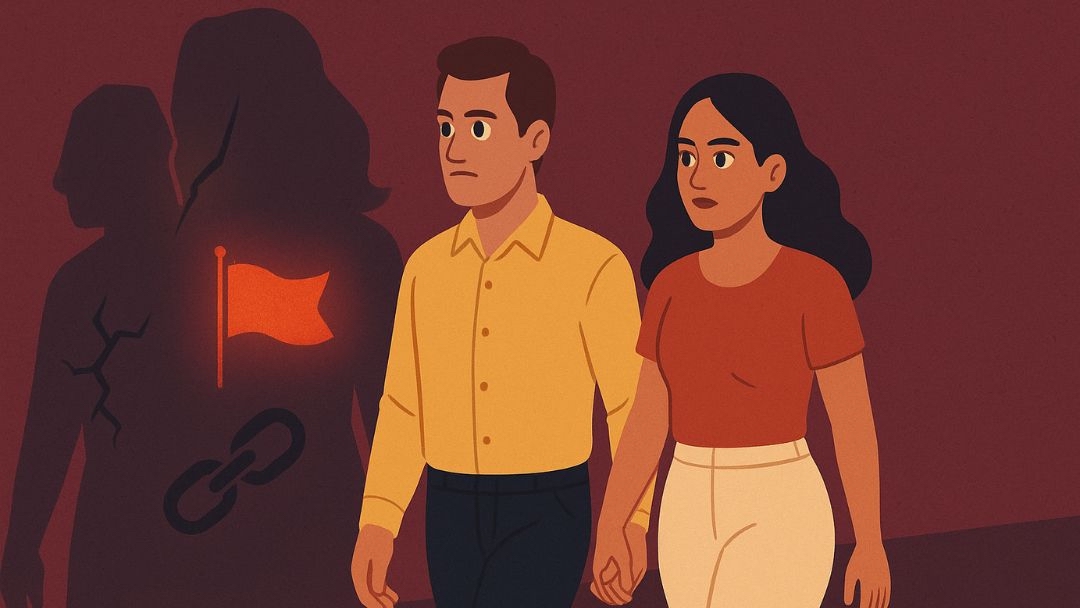
If your relationship doubt stems from control, manipulation, disrespect, or harm, it’s a red flag, and the only healthy response is to protect yourself. A healthy relationship never requires you to tolerate harm, silence your needs, or compromise your safety.
Red flags are patterns of behavior that cause emotional, mental, or physical harm to either partner. In men, they might show up as narcissistic tendencies, substance use, or aggression. In women, they might appear as extreme jealousy, constant criticism, or gaslighting.
While these examples are common patterns, any of these behaviors, narcissism, for example, can occur in people of any gender.
Red flags don’t improve with patience, love, or compromise. If you find yourself excusing harmful behavior or waiting for someone to change, ask yourself: What would I tell my best friend to do in my place?
If setting healthy boundaries doesn’t work, it may be time to seek professional help or get out.
Use Your Relationship Doubts as Fuel for Growth
I’ve learned that doubt is almost inevitable in any relationship, and it’s not always a bad thing. Doubts can point you toward what needs attention in your relationship. Try these simple moves when you experience them.
Start by naming the doubt and the feeling behind it. Ask yourself if it’s a one-time worry or a recurring theme. Then, communicate openly with your partner to clear up misunderstandings before they grow. If the doubt is tied to anxiety, low self-esteem, or fear, try grounding or mindfulness meditation to keep you from spiraling.
Doubts can spark deeper conversations, strengthen trust, and bring you closer together. Handled wisely, you can turn your doubts into stepping stones toward a relationship that’s worth your time, love, and energy.
Related: What Are You Looking for in a Relationship? Answer with Confidence


Return to Blog

